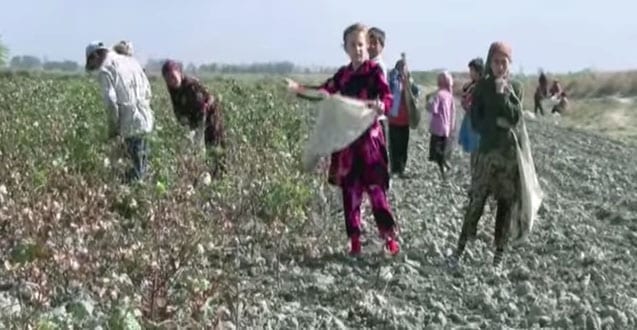
Jul 28, 2015
The U.S. State Department boosted the ranking of Uzbekistan in its Trafficking in Persons report, while keeping Turkmenistan at a higher ranking than human rights activists believe is warranted.
Earlier this year, the Solidarity Center was among 30 global unions, business associations and nonprofit networks urging the U.S. State Department to ensure its Trafficking in Persons report accurately reflect the serious, ongoing and government-sponsored forced labor in Turkmenistan and Uzbekistan.
Uzbekistan is now on the “Tier 2 Watchlist,” which means the State Department claims its government does not fully comply with the U.S. Trafficking Victims and Protection Act (TVPA) standards but is making significant efforts to become compliant. In its 2014 report, the State Department ranked Uzbekistan as “Tier 3,” a designation that means it does not fully comply with the minimum TVPA standards. Turkmenistan remains on the Tier 2 Watch List.
Noting that in 2014, Uzbekistan “forced more than a million citizens to harvest cotton and farmers to grow cotton, all under threat of penalty,” the nonprofit Cotton Campaign said in a statement that “the Uzbek government continues to operate one of the largest state-orchestrated systems of forced labor in the world.”
“Further, authorities suppress any attempts by citizens to report on these abuses and continue to publicly deny the use of forced labor.”
Last month, an Uzbek human rights monitor says she was arrested and assaulted as she sought to document the Uzbek government’s forced mobilization of teachers and doctors to clear weeds from cotton fields outside Tashkent, the capital.
In Turkmenistan, tens of thousands of teachers, doctors and other public employees were forced, under the threat of dismissal, to spend four months in the cotton fields, according to a 2014 report by Alternative Turkmenistan News. “The working and living conditions of the forced laborers were abysmal, with people often having to sleep in the open air, drink ditch water and bathe in irrigation channels.”
“The Turkmen government has maintained a dark cloud of secrecy over its human rights abuses for far too long,” says Ruslan Myatiev, editor at Alternative Turkmenistan News. “Turkmenistan may be a small country, but it is the world’s seventh-largest cotton exporter and manufactures garments in-country for major Western brands.”
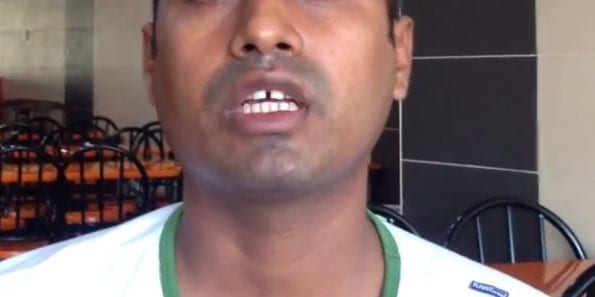
Jul 27, 2015
Thailand is failing to comply with minimum standards to address human trafficking, while Malaysia is “making significant efforts” to eliminate human trafficking, according to the U.S. State Department in its annual Trafficking in Persons Report released today.
The State Department retained Thailand on “Tier 3,” the report’s bottom ranking, and upgraded Malaysia from Tier 3 to the “Tier 2 Watchlist.” The State Department also upgraded Uzbekistan from Tier 3 to the Tier 2 Watchlist. Countries receiving “Tier 3” rankings are subject to withholding or withdrawal of U.S. non-humanitarian and non-trade-related assistance.
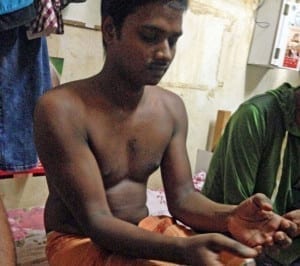
Speaking with union representatives, a migrant worker in Malaysia describes deplorable working conditions. Credit: MTUC
In May, hundreds of bodies were found in 139 mass graves at suspected human trafficking camps on the border of Malaysia and Thailand. According to local news, Malaysian border patrol knew about the camps for 10 years, says Karuppiah Somasundram, assistant secretary of education for the Malaysian Trades Union Congress (MTUC). No arrests have been made.
“Why (doesn’t the government) charge them and show the world something has been done? The local television said most of the deaths were due to hunger. You left them to die like that?” asked Karuppiah.
Since January, the MTUC and the General Federation of Nepalese Trade Unions (GEFONT), both Solidarity Center allies, have documented hundreds of cases of employer abuse of migrant workers in Malaysia, often rising to the level of forced labor. Many of these workers, from India, Nepal, Sri Lanka, China and elsewhere, report that their employer had not paid them, or had given them wages far below what they had been promised before leaving home.
The widespread abuse reported across industries and by large numbers of workers demonstrate that these cases are not isolated incidents involving rogue employers, but workplace practices condoned within an officially sanctioned environment that denies fundamental human rights. A Wall Street Journal report today describes the slave-like conditions of migrant workers at Malaysia’s palm oil plantations. Karuppiah says the government employs few labor inspectors, making it unlikely they will travel to far-away plantations to look for workplace violations.
“Our allies in Malaysia are telling us there is still massive exploitation of migrant workers and rampant abuse of their rights,” says Solidarity Center Executive Director Shawna Bader-Blau. “Migrant workers are beaten, held against their will, often unpaid and forced to live in unsanitary conditions, without running water, electricity or even mattresses to sleep on.”
“Many employers are still wrongly holding on to passports and work passes/visas/permits,” the MTUC said in a statement. “When workers claim their rights through existing legal avenues, many employers simply terminate their workers, and for migrant workers this also mean the loss of ability to stay in Malaysia which is a requirement in law if they want to pursue their claims for justice.”
In Uzbekistan, teachers, doctors and other medical staff are forced to take part in the country’s cotton harvest for several weeks at a time, a coerced mass mobilization of millions that involves extortion and bribery, according to a report released earlier this year by the nonprofit Uzbek-German Forum for Human Rights.
Last month, an Uzbek human rights monitor says she was arrested and assaulted as she sought to document the Uzbek government’s forced mobilization of teachers and doctors to clear weeds from cotton fields outside Tashkent, the capital.
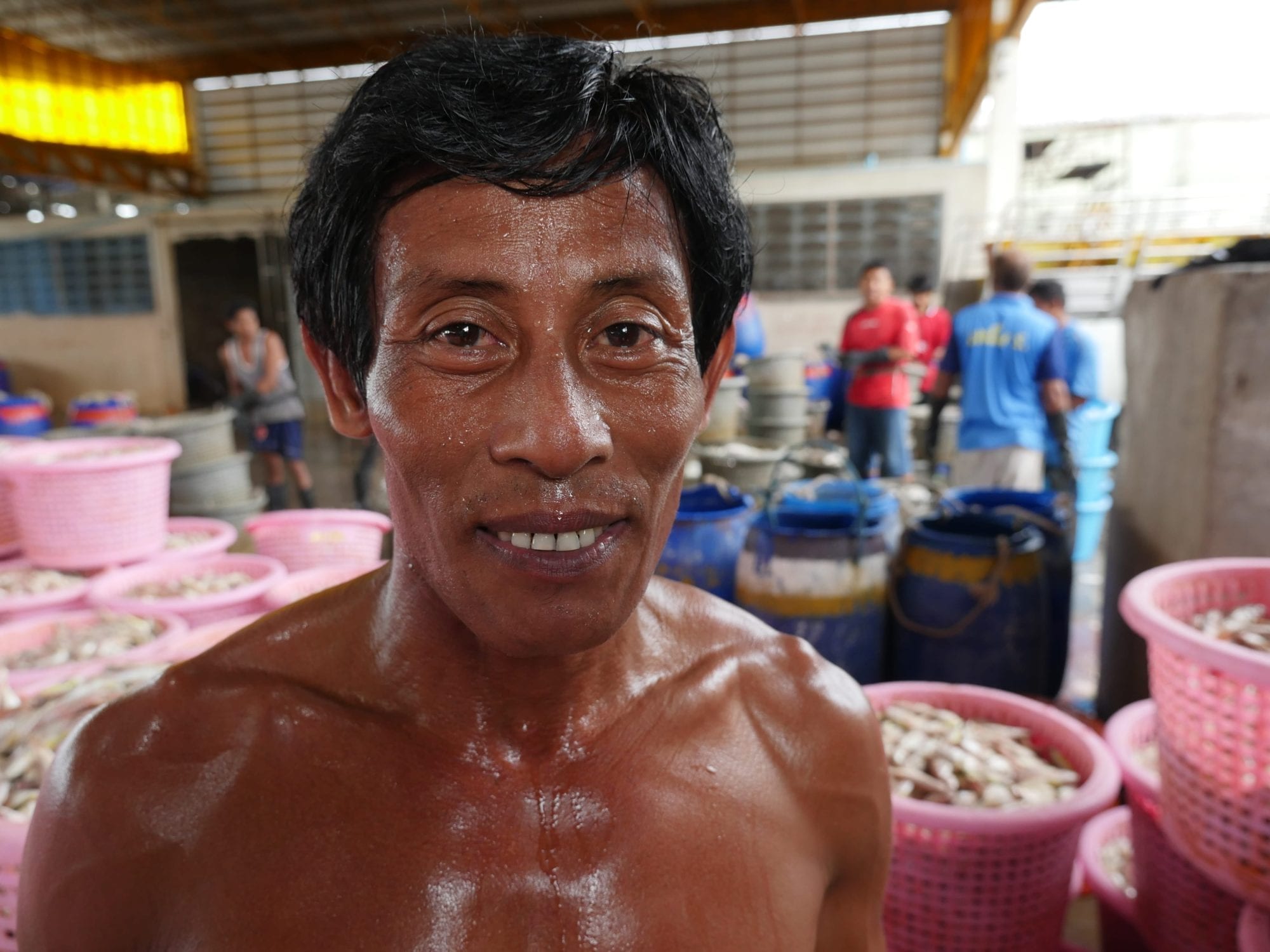
Jul 4, 2015
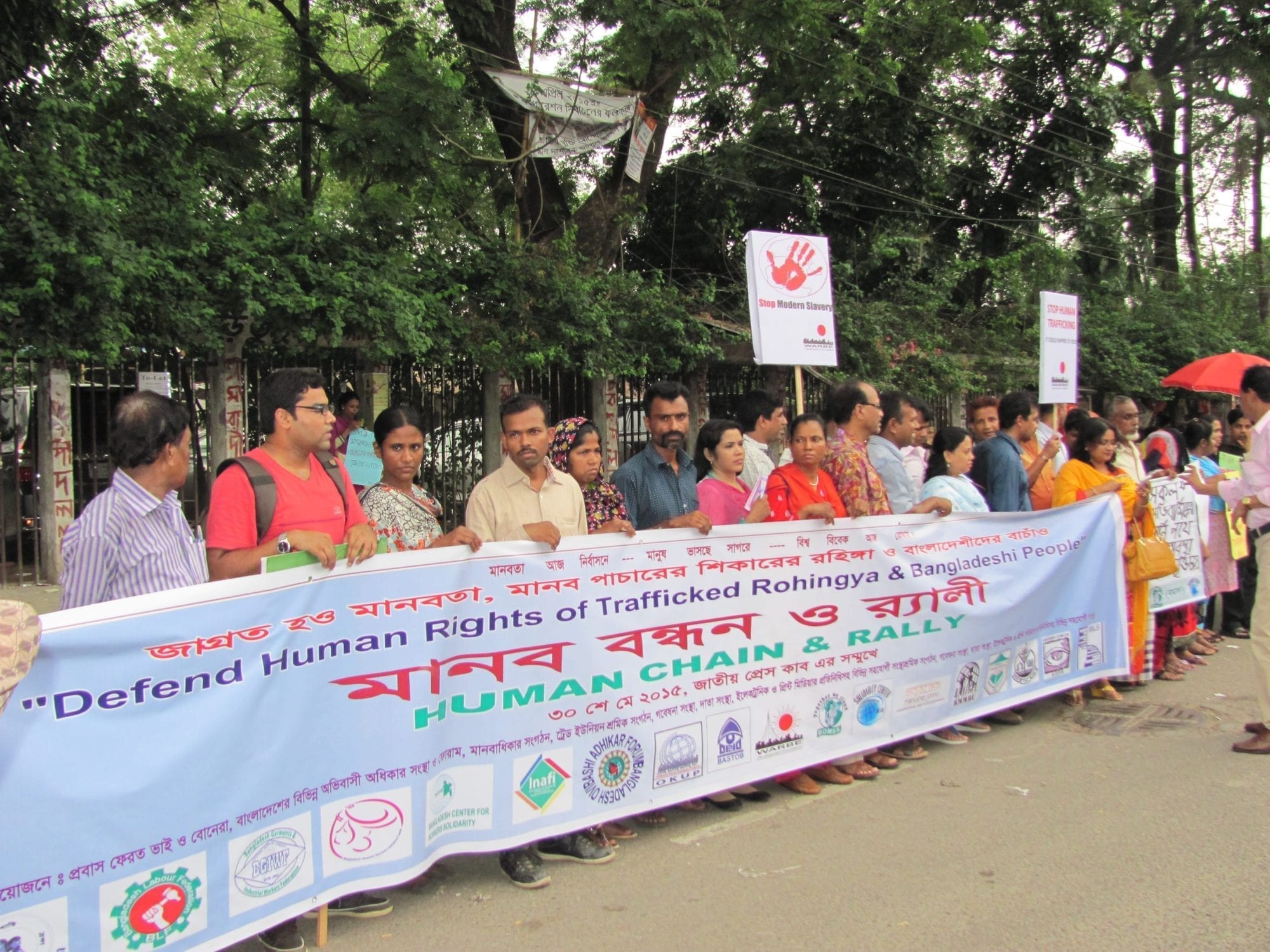
Jun 5, 2015
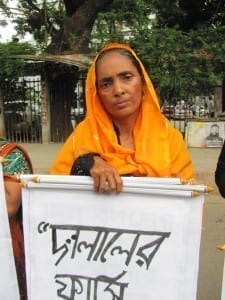
Selina Begum’s son has been missing at sea since he migrated for work. Credit: Solidarity Center/Mushfique Wadud
Selina Begum, 60, traveled from Bangladesh’s northeast Narshindi district to Dhaka, the capital, for one reason, she says: “I want to know the whereabouts of my son.”
Selina’s son, Taizul Islam Rakib, 22, is among the thousands of workers and their families who have migrated overseas to find jobs. Selina says she glimpsed her son in a television news story on the plight of migrants abandoned on boats, but has not heard from him.
Over the weekend, Selina joined dozens of those with missing loved ones in a human chain in downtown Dhaka, where they carried signs, “Punish the trafficking traders,” and held a press conference demanding the government take action. They were joined by repatriated victims of human trafficking like Abdur Rahman, 40, who was rescued from Malaysia and returned to Bangladesh.
“I did not get anything to eat for 22 days and just survived by eating tree leaves,” Abdur said, describing his journey to Malaysia.” “I never thought I would survive.”
Fulmoti, 35, has been waiting for a phone call from her husband Faruk Hossain, 40, who set out for Malaysia by sea on April 14. “My morning starts with the hope that my husband would phone me, but every night I go to bed feeling hopeless,” says Fulmoti, a mother of two.
The event was organized by 19 labor and human rights organizations, including the Solidarity Center and its allies, the Bangladesh Center for Workers Solidarity (BCWS), the Bangladesh Garment and Industrial Workers Federation (BGIWF) and the Bangladesh Independent Garment Workers Union Federation (BIGUF). The coalition issued a joint statement urging governments in origin and destination countries to take immediate action to repatriate migrants and punish traffickers.
Speaking at the event, Syed Saiful Haque, chairman of WARBE Development Foundation, a Bangladesh emigrant rights group, said that the immediate repatriation of trafficking victims should be governments’ first priority. In addition, said Syed Sultan Uddin Ahmmed, assistant executive director of the Bangladesh Institute of Labor Studies, the government must take action against the leaders of trafficking chains.
The event stems from a decision by members of WARBE, the Bangladeshi Ovhibashi Mohila Sramik Association (BOMSA) and Solidarity Center to work together in raising the issue of trafficked migrants. The group is asking the Bangladesh government to take steps to repatriate trafficking victims and rehabilitate them; demanding prosecution of traffickers; and urging the government to work with other concerned governments to prevent stop criminal trafficking.
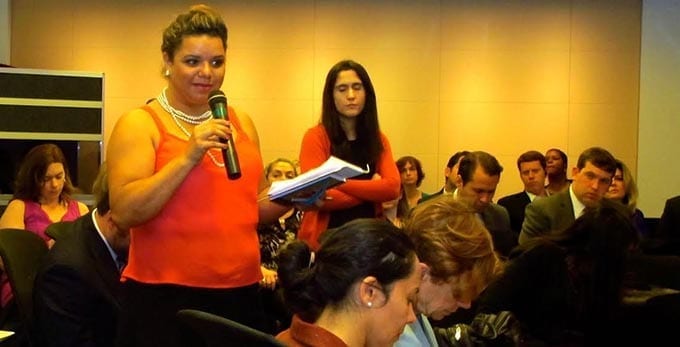
Apr 27, 2015
Mércia Silva, director of Brazil’s InPacto, an organization focused on eradicating forced labor in businesses and their supply chains, often must meet with owners and managers of companies where forced labor exists. But she doesn’t approach them “with theory,” she says.
“I take a photograph of a worker working under extremely difficult conditions and I ask them, ‘Would you like someone in your family to work like this?’ ‘Of course not,’ they say, and from there we are able to make change.”
Silva shared her strategies for empowering workers last week on the panel, “Raising the Floor—Fresh Thinking to Improve Working Conditions and Workers’ Rights,” a discussion on worker-driven strategies to improve conditions for workers enduring the most abusive conditions. The panel was part of a two-day, two-city International Labor Organization (ILO) conference, Out of the Shadows: Innovative Approaches to Combating Forced Labor and Other Forms of Worker Exploitation.
“The presence of forced labor in society doesn’t happen in a vacuum,” said Solidarity Center Executive Director Shawna Bader-Blau. “Forced labor is created by policy. And change comes from the demands and voices of workers and their unions standing up for their rights, standing up for better treatment.” Bader-Blau facilitated the panel, whose primarily U.S.-based participants discussed a range of strategies—including enlisting consumers and the global labor movement—to assist workers in winning their rights on the job.
“You can’t organize anyone with a vague vision,” said Saket Soni, executive director of the National Guestworker Alliance. “These are people who have been staring into the face of evil (forced labor). The alternative has to be concrete. For us, that alternative is, ‘what if you could sit down and negotiate a contract with your employer?’ The only way you can do that is to collectively organize.”
Silva praised Brazil’s Central Union of Workers (Central Unica dos Trabalhadores, CUT) and other Brazil union federations for seeking to make worker rights a reality for agricultural laborers toiling under what she described as “horrible working conditions.
“It’s important to open the door to unions” for these workers, she said. The Solidarity Center works with CUT and other Brazil union federations to help empower vulnerable workers. The AFL-CIO and the CUT have a several decade-long partnership to promote fundamental labor rights in the United States, Brazil and across the Americas.
Women make up a large percentage of workers in forced labor, and panel participants pointed to their key role in taking the lead to improve their working conditions. Neidi Dominguez, director of the AFL-CIO Worker Centers and Community Engagement, discussed how even though Los Angeles carwash workers are predominantly male, women workers were among those who stood up and demanded to be paid a regular wage. Until they did, carwash workers were paid on through pooled customer tips.
The conference, held in in Washington, D.C., on April 22 and in Los Angeles on April 24, brought together representatives from civil society, government and business to discuss strategies to prevent and mitigate exploitative labor practices, with a focus on the United States and Brazil. These strategies aim to decrease workers’ vulnerability to forced labor and other forms of worker exploitation.
“Raising the Floor” panelists also included Steve Hitov, general counsel for the Coalition of Immokalee Workers; and Haeyoung Yoon, deputy program director at the National Employment Law Project.







